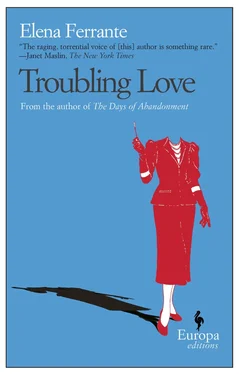It was then that I saw him for the first time. “May I be of help?” he asked when I bumped into him: an instant, time to feel against my face the material of his shirt, notice the blue cap of the pen that stuck out of his jacket pocket, and meanwhile register the uncertain tone of voice, a pleasant odor, the sagging skin of his neck, a thick mass of white hair, neatly combed.
“Do you know where there’s a drugstore?” I asked without even looking at him, engaged as I was in a rapid swerve intended to cancel out that contact.
“On Corso Garibaldi,” he answered as I re-established a minimum of distance between the compact smear of his bony body and me. Now, in his white shirt and dark jacket, he was as if pasted to the façade of the Albergo dei Poveri. I saw him pale, carefully shaved, without wonder in a gaze that I disliked. I thanked him almost in a whisper, and went in the direction he had indicated.
He followed me with his voice, which changed from courteous to a threatening hiss of words that became more and more vulgar. I was hit by a stream of obscenities in dialect, a soft river of sound that involved me, my sisters, my mother in a concoction of semen, saliva, feces, urine, in every possible orifice.
I turned suddenly, all the more astonished as the insults were unmotivated. But the man was no longer there. Maybe he had crossed the street and disappeared among the cars, maybe he had turned the corner toward Sant’Antonio Abate. Slowly I let the pounding of my heart become normal and an ugly homicidal impulse evaporate. I went into the drugstore, bought a package of tampons, and went back to the bar.
I arrived at the cemetery in a taxi, just in time to see the coffin lowered into a pit of gray stone, which was then filled with earth. My sisters left right after the burial, by car, with their husbands and their children. They couldn’t wait to get home and forget. We embraced and promised to see each other again soon, but we knew that we wouldn’t. At most we would, from time to time, exchange phone calls, to measure the increasing rate of mutual estrangement. For years we had all three lived in different cities, each with our own life and a past in common that we didn’t like. The rare times we met we preferred to be silent about all the things we had to say to each other.
Left alone, I thought that Uncle Filippo would invite me to his house, where I had been staying for the past few days. But he didn’t. I had announced to him in the morning that I had to go to my mother’s apartment, to pick up the few objects that had sentimental value, and cancel the lease, the electricity, the gas, the telephone; and he had probably thought it was pointless to ask me. He went off without saying goodbye, bent, with dragging feet, worn out by age and by that sudden accumulation of old rancors that made him vomit up extravagant insults.
So I was forgotten on the street. The crowd of relatives departed to the outlying neighborhoods from which they had come. My mother had been buried by insolent undertakers at the bottom of a pit stinking of wax and decaying flowers. I had a backache and stomach cramps. I made up my mind reluctantly: I walked along the burning-hot wall of the Botanic Garden to Piazza Cavour, in air made heavier by the exhaust from the cars and the buzz of dialect sounds that I deciphered unwillingly.
It was the language of my mother, which I had vainly tried to forget, along with many other things about her. When we saw each other at my house, or I came to Naples for fleeting, half-day visits, she would make an effort to use a stiff Italian, and, in annoyance, just to help her, I would slip into dialect. Not a joyous or nostalgic dialect but unnatural, used inexpertly, pronounced stiltedly, like a barely known foreign language. In the sounds that I uttered uneasily was an echo of the violent quarrels between Amalia and my father, between my father and her relatives, between her and the relatives of my father. I became impatient. Soon I returned to my Italian and she settled into her dialect. Now that she was dead and I could eliminate it forever, along with the memory that it conveyed, hearing it provoked anxiety. I used that language to buy a pizza fritta stuffed with ricotta. After days of near-fasting, I ate with pleasure, wandering through the neglected gardens with their struggling oleanders, and scanning the many groups of old people. The assaultive traffic of people and cars near the gardens made me decide to go to my mother’s.
Amalia’s apartment was on the fourth floor of an old building girded with scaffolding. The building was one of those edifices in the city center that were half deserted at night and during the day inhabited by clerks who renew licenses, hunt down birth or residency certificates, interrogate computers for reservations or tickets on planes, trains, and ships, draft insurance policies for theft, fire, illness, death, compile complicated statements of income. The ordinary tenants were few, but when my father, more than twenty years earlier — the moment Amalia told him that she wanted to separate from him, and we daughters firmly supported her in that choice — chased all four of us out of the house, it was there that, by chance, we had found an apartment to rent. I had never liked the building. It made me restless, like a prison, a court, a hospital. My mother, however, liked it: she found it imposing. In fact it was ugly and dirty, right down to the big outside door, which was routinely forced open every time the superintendent had the lock repaired. The panels were dusty, blackened by exhaust fumes, with big brass knobs that hadn’t been polished since the start of the century. During the day, there was always someone standing in the long cavernous passage that led to an internal courtyard: students, people waiting for the bus that stopped a little farther on, peddlers selling lighters, Kleenex, toasted corn or roasted chestnuts, tourists sheltering from the heat or the rain, surly men of all races in perennial contemplation of the display windows that ran along the two walls. Usually these men passed the time waiting for whatever staring at the art photographs of an elderly photographer who had a studio in the building: brides and bridegrooms in their wedding outfits, smiling, luminous girls, youths in uniform with impudent expressions. Years earlier a passport-type photograph of Amalia had also been displayed for a couple of days. I myself had warned the photographer to remove it, before my father, passing by, flew into a rage and smashed the window.
I crossed the inner courtyard with my eyes lowered and went up the short flight of steps that led to the glass door of stairway B. The porter was absent and I was relieved. I got into the elevator quickly. It was the only place in that whole building that I liked. In general I wasn’t fond of those metal sarcophagi that rise rapidly or plunge down as soon as you touch the button, making a pit in your stomach. But this one had wood-paneled walls, glass doors with gray arabesques around the edges and fine brass handles, two graceful wooden benches that faced each other, a mirror, and dim lighting; and it lurched up and down with a concert of squeaks, at a restful pace. A coin box from the fifties, with a broad belly and a curved beak pointing upward, ready to swallow change, emitted a metallic sigh at every floor. Although for many years now the car had been set in motion by the mere press of a button, the coin box remained uselessly nailed to the right-hand wall. Yet, while it disrupted the tranquil old age of that space, the box, with its abstinent emptiness, didn’t displease me.
I sat on a bench and did what, as a girl, I had done whenever I needed to calm myself: instead of pressing the button with the number 4 on it, I let myself go up to the sixth floor. That space had been empty and dark for many years, ever since the lawyer who had his office there had left, taking with him even the light bulb from the landing. When the elevator stopped, I let my breath glide into my stomach and then return slowly to my throat. As always, after a few seconds, the light in the elevator went out, too. I thought of reaching my hand out to one of the door handles: you had only to pull it and the light would return. But I didn’t move and continued to send my breath deep into my body. The only sound was that of the woodworms eating into the paneled walls.
Читать дальше












